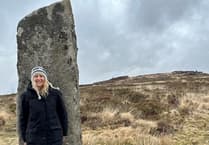THE UNTOLD story of Tavistock’s past as a hotbed of radical action and progressive writings and philosophy is now being unveiled to audiences, writes Guy Boswell.
Spreading the word is Andrew Thompson, independent heritage consultant, who, appropriately, lives on one of the town’s streets – Old Exeter Road – noted for what was then thought of as ‘subversive’ thought and behaviour.
Andrew, who has been involved in many notable landscape and heritage projects in West Devon and beyond, says the town stood out in the early 1800s especially for certain people espousing free thinking views which challenged the way society should be run and suggested big changes in voting being extended beyond the wealthy and privileged.
Andrew believes Tavistock’s image has been sanitised and he is shining a light on more exciting aspects of the town’s past which, to some extent, have shaped the present. His findings have relevance today in the way freedoms fought for then might be under threat today.
He said: “Tavistock’s image has long been sanitised. It’s now seen as a typical market town set in a rural idyll. But for most of its history that has not been the case. For instance, it was an industrial town in the late 18th century with much of the deprivation and overcrowding associated with bigger towns and cities. However, the stereotypical view of the working class as uneducated and either unruly or subservient is not true in Tavistock. The working population in Tavistock was not simply dirty and illiterate, even though they lived in overcrowded streets like Old Exeter Road and Bannawell Street. This environment was a hotbed of radical thought by people who wanted to give working people a voice and improve their conditions”
He added: “The national Times newspaper of the day noted that Tavistock had a tradition of radicalism and was allied to Methodism and in the first half of the 19th century particularly to Unitarianism at the Unitarian Church which was on the site of the old Abbey Chapel. A key Unitarian radical leader here was Henry Solly who was also a national Chartist activist. The 1830s. Chartists demanded major changes under a Charter on constitutional reform, universal male suffrage, wages for MPs, an annual parliament and secret ballots. Overall Parliament should then be able to ‘represent the people’, they said and was aimed at ‘curing the social ills’ from the industrial revolution, which was affecting Tavistock.”
Andrew said it was amazing that four people, living in Old Exeter Road and Barley Market Street, from the small town were sent to a national Chartists meeting. The town had a Chartist Association and miners joined other workers to organise political and philosophical discussions – they were far from the stereotypical picture of drunken fighting people often portrayed at the time.
Another freethinking figure in the area, from Prayle House on Church Lane, was Charles Hall, also a Unitarianist, who wrote a highly influential book of early socialist political thought which was a farsighted forerunner of Marx’s ideas. Under his thinking the solution to society’s ills was to return to that familiar Tavistock picture of a rural idyll, by living off the land and providing allotments to everyone.
John Rundle, a Tavistock MP in the 1830s was also influential in campaigning for improving the franchise.
“There was an extensive campaign in the 1820s and 1830s for extending the vote to the middle classes and for Catholic emancipation and empowerment. This was quite extraordinary for a small town.”
The Bedfords, the highly influential landowners, helped create the environment of tolerance for some more forward thinking.
“The sixth Duke of Bedford was regarded as coming from the radical side of politics with his views of reform while the seventh Duke of Bedford’s brother was a key architect of the 1832 Reform Act which extended the franchise. This was seen as a necessary move to avoid unrest and large scale revolution. The Bedfords helped create a society in Tavistock which was more tolerant of alternative views and allowed such meetings in their properties such as Tavistock Guildhall. Many meetings were about asserting the right to assemble and protest.
“There were many meetings in Tavistock in the early 19th century in support of the aspiration. This reached a peak in 1819 after the Peterloo Massacre in Manchester where militia killed unarmed protesters campaigning for ordinary people’s rights. This as contemporary resonance today with the Government’s laws on protesters being tightened.”




